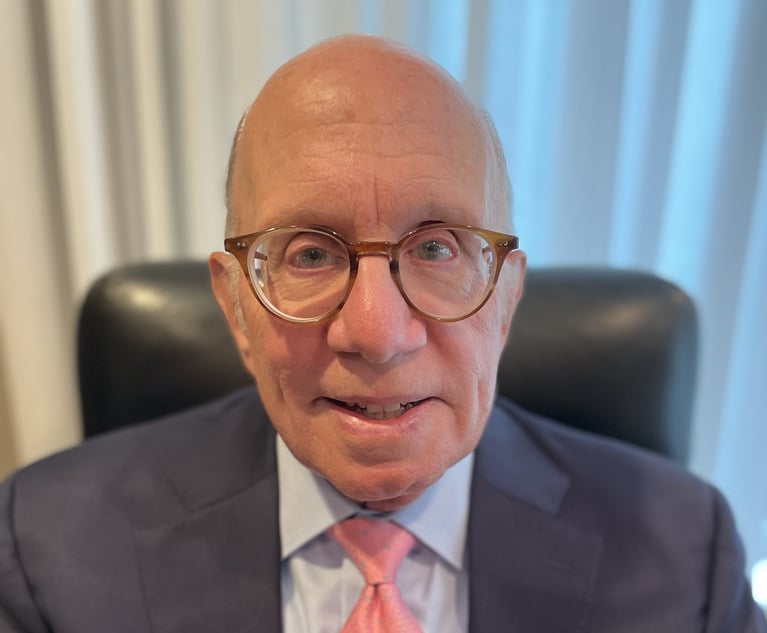COVID-19's Hidden Legal Crisis for Small Businesses
Confession of judgment clauses have been criticized as a violation of the due process right of notice and opportunity to be heard.
April 17, 2020 at 10:00 AM
5 minute read
 As the country confronts the myriad economic challenges posed by our response to COVID-19, lawmakers and commentators have expressed special concern for how small businesses will weather the slow down or total shut down of operations necessitated by the social distancing efforts in force in states and municipalities across the nation. The current legislative efforts to help small businesses stay afloat while the economy is in a "medically induced coma," should provide some relief. But the COVID-19 shutdown is poised to accelerate and exacerbate another looming financial and legal crisis facing small businesses—the use of "confession of judgment clauses" that permit creditors to prevail in lawsuits that are used to obtain judgments on loans allegedly in default without even providing the debtor of notice of the lawsuit. In New York state alone, these judgments have totaled over $1.5 billion in a recent six-year period.
As the country confronts the myriad economic challenges posed by our response to COVID-19, lawmakers and commentators have expressed special concern for how small businesses will weather the slow down or total shut down of operations necessitated by the social distancing efforts in force in states and municipalities across the nation. The current legislative efforts to help small businesses stay afloat while the economy is in a "medically induced coma," should provide some relief. But the COVID-19 shutdown is poised to accelerate and exacerbate another looming financial and legal crisis facing small businesses—the use of "confession of judgment clauses" that permit creditors to prevail in lawsuits that are used to obtain judgments on loans allegedly in default without even providing the debtor of notice of the lawsuit. In New York state alone, these judgments have totaled over $1.5 billion in a recent six-year period.
With a confession of judgment or "cognovit note," all the creditor needs to do is go to court with an allegation that the debtor has not paid on the loan in accordance with the contract, and produce the confession of judgment in which the debtor claims to have knowingly waived the right of notice. Armed with these documents, the creditor can obtain a legally binding and enforceable judgment against the debtor—all before the debtor has any idea that she has been sued, let alone the chance to defend herself in court. Typically, the first time that the debtor learns that she has been sued is when a bank account has been frozen or property seized as a means of enforcing the judgment.
If this sounds outrageous to you, you are not alone. Confession of judgment clauses have been criticized as a violation of the due process right of notice and opportunity to be heard. Many states have outlawed them altogether, or severely limited their use, and even the most permissive states prohibit the use of confession of judgment clauses in consumer contracts. The U.S. Supreme Court has sanctioned the use of such clauses in commercial (but not consumer) transactions.
As an explosive report revealed in 2018, this commercial-versus-consumer distinction matters little when it comes to the predatory lending practices that some lenders have used in making loans to small businesses. These loans contain confession of judgment clauses that are enforceable in the New York state courts that have been all too eager to enter judgment against the debtor upon only the word of the lender and the production of the confession of judgment document. Because many small businesses operate at tight margins and are tightly bound up with the few individual proprietors, the effect has been the personal ruin of many a small business owner. Even worse are reports that some of these judgments were obtained using fraudulent or forged documents. Unfortunately, that fact is of little use to the debtor whose ability to hire counsel and contest the judgment in court is further hampered by the decimation of assets.
The confession of judgment problem was of sufficient concern that the U.S. Senate considered bipartisan legislation to ban the use of confession of judgment clauses in small business loan transactions. But like so many other legislative efforts, this bill had stalled in Congress even prior to first quarter 2020, and Congress may not appreciate the urgent relevance to COVID-era small business enough to revive it.
Meanwhile, the confession of judgment problem is poised to move from deeply problematic to a full-blown crisis. Imagine an untold number of small businesses who, in addition to finding themselves unable to pay their various creditors, live under the threat that their bank accounts will be frozen and important assets seized, many of those assets being crucial to the operation of the business should it be able to re-open once the COVID-19 health crisis has abated.
Lawmakers need to take the confession of judgment problem seriously, especially lawmakers in New York State, the origin of many loans with confession of judgment clauses to businesses both inside and outside of the state. Doing so would prevent an explosion of judgments and asset seizures down the road. The first step is for states to pass legislation banning the use of confession of judgment clauses—a step that many states have already taken but is of little help to their citizens if they obtain a loan from a creditor in a state that permits confession of judgment. Congress should revive its effort to amend the Truth in Lending Act to codify the ban on confession of judgment clauses in consumer contracts and extend that ban to small business loans. And a truly generous effort would include special aid for those businesses whose impending COVID-19-related losses will be compounded by the difficulties attendant in being unable to challenge the repayment action in court.
Finally, perhaps this is the moment where many Americans have had the chance to consider that the small businesses they love are often nearly synonymous with the real people who run them. We should harness this sentiment to buffer small business owners against ruinous practices that no state would permit if they were in consumer contract. It is time to put an end to confession of judgment clauses. We don't need to wait for the courts—this is something that Congress and state legislatures can do right now. And they should.
Robin J. Effron is professor of law at Brooklyn Law School where she serves as co-director for the Dennis J. Block Center for the Study of International Business Law. She teaches civil procedure, litigation, and international business law courses. Professor Effron also edits the Civil Procedure and Federal Courts Blog for the Law Professors Blog Network.
This content has been archived. It is available through our partners, LexisNexis® and Bloomberg Law.
To view this content, please continue to their sites.
Not a Lexis Subscriber?
Subscribe Now
Not a Bloomberg Law Subscriber?
Subscribe Now
NOT FOR REPRINT
© 2024 ALM Global, LLC, All Rights Reserved. Request academic re-use from www.copyright.com. All other uses, submit a request to [email protected]. For more information visit Asset & Logo Licensing.
You Might Like
View All
Patent Trolls Come Under Increasing Fire in Federal Courts

Why Is It Becoming More Difficult for Businesses to Mandate Arbitration of Employment Disputes?
6 minute readTrending Stories
- 1Judge Denies Sean Combs Third Bail Bid, Citing Community Safety
- 2Republican FTC Commissioner: 'The Time for Rulemaking by the Biden-Harris FTC Is Over'
- 3NY Appellate Panel Cites Student's Disciplinary History While Sending Negligence Claim Against School District to Trial
- 4A Meta DIG and Its Nvidia Implications
- 5Deception or Coercion? California Supreme Court Grants Review in Jailhouse Confession Case
Who Got The Work
Michael G. Bongiorno, Andrew Scott Dulberg and Elizabeth E. Driscoll from Wilmer Cutler Pickering Hale and Dorr have stepped in to represent Symbotic Inc., an A.I.-enabled technology platform that focuses on increasing supply chain efficiency, and other defendants in a pending shareholder derivative lawsuit. The case, filed Oct. 2 in Massachusetts District Court by the Brown Law Firm on behalf of Stephen Austen, accuses certain officers and directors of misleading investors in regard to Symbotic's potential for margin growth by failing to disclose that the company was not equipped to timely deploy its systems or manage expenses through project delays. The case, assigned to U.S. District Judge Nathaniel M. Gorton, is 1:24-cv-12522, Austen v. Cohen et al.
Who Got The Work
Edmund Polubinski and Marie Killmond of Davis Polk & Wardwell have entered appearances for data platform software development company MongoDB and other defendants in a pending shareholder derivative lawsuit. The action, filed Oct. 7 in New York Southern District Court by the Brown Law Firm, accuses the company's directors and/or officers of falsely expressing confidence in the company’s restructuring of its sales incentive plan and downplaying the severity of decreases in its upfront commitments. The case is 1:24-cv-07594, Roy v. Ittycheria et al.
Who Got The Work
Amy O. Bruchs and Kurt F. Ellison of Michael Best & Friedrich have entered appearances for Epic Systems Corp. in a pending employment discrimination lawsuit. The suit was filed Sept. 7 in Wisconsin Western District Court by Levine Eisberner LLC and Siri & Glimstad on behalf of a project manager who claims that he was wrongfully terminated after applying for a religious exemption to the defendant's COVID-19 vaccine mandate. The case, assigned to U.S. Magistrate Judge Anita Marie Boor, is 3:24-cv-00630, Secker, Nathan v. Epic Systems Corporation.
Who Got The Work
David X. Sullivan, Thomas J. Finn and Gregory A. Hall from McCarter & English have entered appearances for Sunrun Installation Services in a pending civil rights lawsuit. The complaint was filed Sept. 4 in Connecticut District Court by attorney Robert M. Berke on behalf of former employee George Edward Steins, who was arrested and charged with employing an unregistered home improvement salesperson. The complaint alleges that had Sunrun informed the Connecticut Department of Consumer Protection that the plaintiff's employment had ended in 2017 and that he no longer held Sunrun's home improvement contractor license, he would not have been hit with charges, which were dismissed in May 2024. The case, assigned to U.S. District Judge Jeffrey A. Meyer, is 3:24-cv-01423, Steins v. Sunrun, Inc. et al.
Who Got The Work
Greenberg Traurig shareholder Joshua L. Raskin has entered an appearance for boohoo.com UK Ltd. in a pending patent infringement lawsuit. The suit, filed Sept. 3 in Texas Eastern District Court by Rozier Hardt McDonough on behalf of Alto Dynamics, asserts five patents related to an online shopping platform. The case, assigned to U.S. District Judge Rodney Gilstrap, is 2:24-cv-00719, Alto Dynamics, LLC v. boohoo.com UK Limited.
Featured Firms
Law Offices of Gary Martin Hays & Associates, P.C.
(470) 294-1674
Law Offices of Mark E. Salomone
(857) 444-6468
Smith & Hassler
(713) 739-1250








